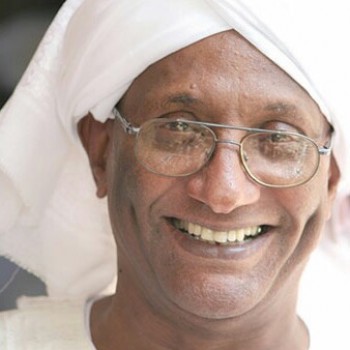Restoring Reputation of Numeiry’s Summary Justice Courts: Towards Marxist Approach to Religion (1)

By: Abdullah Ali Ibrahim
I wanted to involve the young people of writing and thought in the experience of the Communist Party in dealing with engaging religion after the dissolution of the party in 1956. So we came away with a feeling of grief from that. Our professor Abdul Khaleq Mahjoub looked into the issue when he saw that we had no choice in the face of that ordeal but to say that the Kizan and Azhari had exploited religion for their own purposes. Although this statement is true, our professor did not want to dismiss the matter as an just “exploitation of religion.” Rather, he refused to be satisfied with what is known as “instrumentalism,” which is ignoring the intensity of the religious presence in our society and limiting it to evil people who subjugate it for their own ends. So you have no result with religion and with them except to curse them as you curse Satan.
I found myself adopting our professor’s plan and almost devoting myself to it for decades. In the summary courts of Numeiri (1984), I found a reason to clash with those who considered it merely a tool for a thug who only wanted to prolong his life in power. I devoted myself to this research project to look beyond Numeiry’s exploitation of religion, that is, at the intensity of the presence of religion in us, which makes Numeiry’s exploitation of it possible in its condition and time.
I present below a research project in which I reconsidered Numeiri’s courts for achieving justice as long as we were in Numeiri’s biography and the tendency of some to review his era, in the hope that we might discover a benefit from him that would be rewarded. The project, in this case, is derived from the fourth chapter of my book, “Manichaean Delirium: Deconstructing the Colonial Judiciary and the Islamic Awakening in Sudan, 1898-1985”, Berl Publishing, Netherlands, 2008, (in English).
In this chapter, I tried to go beyond the concept of “instrumentalism,” which the elite humbled themselves in interpreting Numeiry’s approach to religion and the courts on which it was founded. Instrumentalism is when the ruler and non-ruler make religion a vehicle for their political and worldly purposes. Our phrase “exploitation of religion” summarizes the concept.
The concept of instrumentalism has exempted us from delving into the texts and dynamics of religion as it should be for someone who has taken over or will take over a people, many of whom are Muslim. All of Islam is “politics” from the perspective of instrumentalism, and only every evil exploiter falls upon it. Religion, according to this concept, is a vehicle for the elite and the masses, “popular Islam,” which is mixed with “African paganism,” in Trimingham’s opinion, so there is no benefit or danger from it.
I asked myself: Does religion work for every exploiter at every time and place, or are there evils that occur in society that purify their religion for its people as a key to relief, so the “exploiter” accepts them? I looked around in the United States and found those who wanted to exploit religion and exploit it, such as those who denied the theory of evolution, or like the judge who wanted to rule according to the Ten Commandments. Religion did not follow them because society was not prepared for them. Maybe it will be ready one day.
When we were satisfied with religiosity of the state with the concept of instrumentalism, which limits religion to Safavi Guitun (who is an exploiter of religion in people’s knowledge, such as one who prays and fasts for something he intended), we missed the religiosity of free society in one of its cycles and its demand for justice and equality from among the pages of its religion. Despite Marx’s famous phrase about religion being the opium of the people (instrumentalism), he has a forgotten word, which is his saying that religion is the soul of a world without a soul.
Research project:
This paper seeks to give research consideration to President Numeiri’s experience in applying Sharia law and establishing the concept of “successful justice” and its courts during the years 1983-1985 (Al-Kabbashi 1986, 1987). In September 1983, Numeiri declared Sharia law as an alternative to statutory laws derived from English law. This announcement was made in the wake of a strike by judges that culminated in a long dispute between the president and the judiciary over issues of its independence (Khaled 1985, 1986, 1990, 1993). This conflict was embodied in two concepts of justice. Numairi expressed his concept of complete justice, and it was a criticism of the judiciary, which piled up cases before its courts, thus boring the litigants. He persisted in saying that delaying justice is withholding justice. On the other hand, the judges, who rejected delaying justice due to the small amount spent on it, adhered to their principle that urgent justice is equal to injustice. With the president’s rule based on Sharia law, he transferred the old judicial system to depository. He established a new judiciary that was freed, he claimed, from the consequences of colonialism. Its courts were quick to issue rulings to extend Sharia justice through fair judges, not just judges (Zain 1983).
Professionals and politicians who disparaged Numeiri’s experience criticized its law and professionalism, making its courts a mockery that even researchers avoided and rejected. Their biggest complaint against it is that it was a tool in the hands of a tyrant who saw the edges of his rule being undermined, so he sought to prolong it by exploiting religion. Such an appeal to the objectives is known as “instrumentalism” or “disruption.” Numairi’s critics accused these courts of betraying the profession for submitting to the government, committing obscene transgressions such as executing the elderly Islamic reformer Mahmoud Mohammad Taha, and subjecting non-Muslims to the punishments of Sharia law (Al-Na’im 1986).
The paper acknowledges the validity of these criticisms that made this justice merely a political pawn of Numeiri, so that Mohammad Zain said that the essence of Numeiri’s courts was hostility to the “troubling” judiciary that existed at that time (1983). However, he goes further and discusses President Numeiry’s Islamization of the state in light of the controversy over crime and punishment that swept the judiciary and society as a whole in the 1970s and early 1980s. We will focus in particular on the “outrage for justice” that appeared in that disturbing speech regarding the state’s failure to enforce it, as well as when people shifted with the philosophy of punishment for reform and modern refinement to religious rule” tooth for tooth”.
We will analyze the discourse of crime, punishment, and anger against justice against the background of the political economy from which it is born. It is known among researchers as the “diaspora economy” (Sayed Ahmed 1996). It is an economy that was surrounded by $3 billion in the years 1984-1985, represented by the remittances of 650,000 Sudanese immigrants to the Peninsula and the Gulf according to the 1990 census. This economy spawned new and horrified crimes that revolved around dishonesty and fraud. Muslims saw it as “false.” This is the basis for our description of it as the “economy of falsehood” in view of the facts of a court that took place in 1979 in which the plaintiff cited the verse: “And do not consume your wealth among yourselves unjustly and bring it to the rulers so that you may consume a portion of the people’s wealth of sin while you know” due to the extreme “blasphemy” of the crime submitted to the court. The false economy took away the minds of the people, and the people of their time denied it. The state was the biggest victim of this falsehood. The criminals stripped it of itsjob and badges by forging its various documents. Many Muslims were embarrassed by all of this and fled to their religion in the context of a multifaceted religious awakening.
He challenges the validity of Numeiri’s opponents, who described his accomplished justice as a mere “disruption” of religion, in the significance of making it a tool for a worldly political purpose, that the subversion itself needs to be clarified, let alone the Islamic awakening be explained by. It is a term for the culture of the Western elite, including the Islamists themselves, and the result of their identity wars. For most of them, religion is forbidden from entering the arena of politics, otherwise it would be in a “state of infiltration.” To prevent the Muslim awakening from being limited to their elite, Rex O’Fahy, the historian of Sudan, wanted to provide a description of the awakening, and Numeiri’s accomplished justice is a depressing chapter among its chapters, in his interpretation of which he goes to: Beyond “the culture, conflicts, and histories of the elite of Western origin” (O’Fahey 1996), the way to do this is to look at its roots among Muslims as an authentic party in the Islamic revival, not an object.



